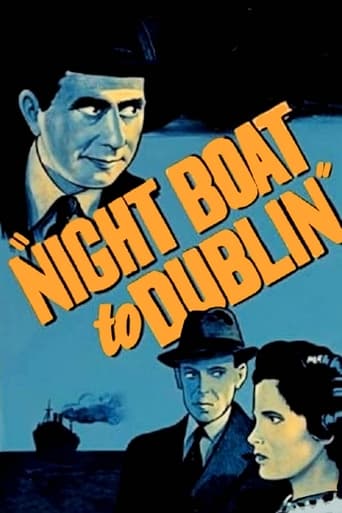JohnHowardReid
I first made the acquaintance of Lawrence Huntington's Night Boat to Dublin on its first release in 1946. I've since reviewed the film another four or five times. On each occasion, this suspenseful spy drama has stood up exceedingly well to re-examination. Huntington's direction is imaginatively forceful, Otto Heller's lighting photography resourcefully noirish. Production values are lavish. While the script incorporates plenty of action, it moves at a commendably fast clip and, most importantly, features some really outstanding performances.In the leading role, Robert Newton makes playing the part of a British agent who is playing the part of playing a part (!) look easy. While Newton accomplishes this astonishing feat with admirable ease, some of the supporting actors lag not too far behind, particularly Joan Maude as the artist, Raymond Lovell as the spy, John Ruddock as his cohort, Leslie Dwyer as a too-shrewd steward, Brenda Bruce as his vampish shrew of a wife, and Muriel Pavlow as the refugee.
Leofwine_draca
NIGHT BOAT TO DUBLIN is a fun spy thriller that must have been shot in the dying days of World War 2. Espionage and its deadly results are the name of the game here, as the British authorities pursue a Nazi organisation running out of Ireland and in particular aim to rescue a kidnapped Swedish scientist who may have the secret to unlocking the atomic bomb. Half of the action is centred around the titular ship, with plenty of cloak and dagger shenanigans to pass the time.And this film certainly passes the time well enough, coming across as fast paced and with just the right level of suspense to see it through. There's an early plot twist to rival PSYCHO and a delightfully urbane villain in the form of the charming Raymond Lovell, who has a real ball with the part. The sneaking around in hotel room material is good fun, too, and Robert Newton is a British hero in the finest stiff-upper-lip tradition. A triumvirate of Herbert Lom, Marius Goring, and Leslie Dwyer flesh out villainous parts, and the action-packed climax is delightful.
wilvram
Robert Newton plays an MI5 man who infiltrates a gang of Nazi agents involved in the capture of a Swedish scientist whose work on developing the Atom bomb is being smuggled out via neutral Ireland. The eponymous night boat plays an important part in the early part of the story though most of the film takes place in England.Not a film of any great depth, its intricate plot and considerable amount of dialogue is directed with speed and skill by Lawrence Huntington, adroitly steering around several implausibilities in the plot. There are likable performances from Robert Newton, and the admirable Raymond Lovell, who seemed to appear in every other 1940s British film, gives a typically urbane performance as the chief villain; John Ruddock is creepily sinister as his secretary. Newton is assisted by the jaunty Guy Middleton, and the pair get away with several double entendres.With superb black and white photography by Otto Heller, it's a ripping yarn from a bygone age of trilby hats, clipped accents, and British pluck.
Neil-117
The flimsy plot of this wartime intelligence story relies on endless coincidences, hunches and lucky breaks. The determinedly amateur British intelligence operation is seriously lacking in direction and professional discipline, but who cares when the script writer is on your side? Such dull viewing could give spies a bad reputation.


